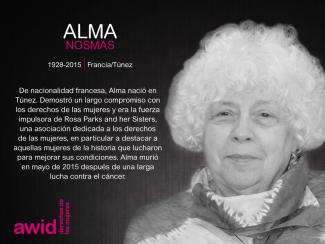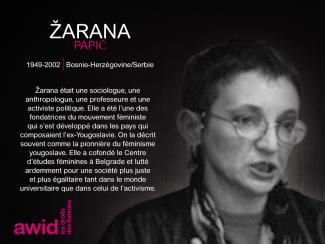Le cadre de référence de votre recherche vous guidera tout au long du processus de recherche. Le document de référence que vous élaborez peut aussi servir de note de synthèse destinée aux personnes qui vous conseillent et à vos partenaires, ainsi qu’à une demande de financement aux éventuels donateurs.
Dans cette section
Avant de mener toute recherche :
Le cadre de votre recherche pourra évoluer avec le temps, alors que vous peaufinez vos questions et recueillez de nouvelles informations. Cependant, le fait de créer un cadre de recherche dès le départ vous permettra de travailler à partir d’une base solide.
Objectifs
Afin que votre recherche WITM ait une base solide, il est important de définir clairement ce que vous souhaitez accomplir.
Par exemple, l’un des objectifs de la recherche mondiale WITM de l’AWID consistait à fournir des données rigoureuses afin de prouver ce que nous savions déjà par ouï-dire : que les organisations de droits des femmes sont sous-financées, et de surcroît de façon marquée. Ces données nous permettraient selon nous d’être en meilleure position pour influencer les prises de décisions des bailleurs de fonds.
Vos objectifs pourraient être les suivants :
- Générer des données précises et concrètes sur les réalités et les tendances de financement afin de confirmer ou d’infirmer les mythes existants.
- Mieux comprendre les différences entre les perspectives des donateurs et celles des organisations de droits des femmes.
- Influencer l’allocation des fonds par les donateurs.
- Ajouter une perspective essentielle aux principaux débats entourant le financement.
- Explorer la collaboration entre les donateurs et les organisations de droits des femmes sur les questions qui émergent de la recherche.
Haut de page
Questions principales
Structurez votre processus de recherche à l’aide de questions clés auxquelles seule votre recherche puisse répondre et limitez ces questions à un laps de temps spécifique (p. ex. la dernière année, les derniers cinq ans, etc.).
Tenez compte des aspects suivants :
- Sur quels sujets précis voulez-vous en apprendre davantage et quelle hypothèse aimeriez-vous vérifier ? Le fait de rédiger ces questions facilitera votre processus de réflexion.
- Existe-t-il des recherches à ce sujet ? Si c’est le cas, il se peut qu’il ne soit pas opportun de mener une recherche WITM, à moins que vous estimiez que la recherche actuelle n’est pas assez complète ou spécifique.
- Quelle période voulez-vous couvrir lors de votre analyse ? Votre analyse portera-t-elle uniquement sur la dernière année, ou sur plusieurs années antérieures, par exemple au cours des cinq dernières années ?
- Prévoyez-vous de répéter votre enquête pour recueillir des données ultérieurement ?
Le fait de choisir une période spécifique pour votre recherche peut mener à des résultats plus précis qu’ils ne le seraient si vous travailliez avec un calendrier ouvert. De plus, la décision de répéter ou non votre recherche à intervalles réguliers vous permettra de fixer des repères de collecte de données, facilitant la reproduction et la comparaison au fil du temps.
Principales questions qui ont guidé le processus de recherche WITM de l’AWID :
- Quelle est la situation actuelle quant à la durabilité financière des organisations de droits des femmes à travers le monde ?
- Quelles sont les tendances externes et internes qui influent sur les décisions de financement des donateurs à l’appui des organisations et des mouvements de femmes ?
Haut de page
Types de données
Maintenant que vous avez défini vos questions principales, vous pouvez déterminer les types de données qui vous aideront à répondre à ces questions. Ainsi, vous serez en mesure de planifier le reste du calendrier de votre recherche WITM.
Par exemple, est-ce que vous mènerez une enquête qui couvre une vaste proportion de votre population prioritaire ? Est-ce que vous analyserez les demandes de financement que les bailleurs de fonds reçoivent dans une région particulière ? Est-ce que vous procéderez à des interviews (recommandé) ? En déterminant quelles sont les données dont vous avez besoin, vous pourrez entrer en contact avec des parties externes qui vous fourniront ces données dès le départ, et serez à même de planifier en conséquence l’ensemble de votre calendrier. Nous vous suggérons les sources de données suivantes :
- Les sondages que vous élaborez à l’intention des organisations de droits des femmes et des donateurs.
- Les données sur les demandes et l’allocation de subventions issues des cycles de financement des donateurs.
- Interviews auprès d’important-e-s activistes, organisations et donateurs.
- Données sur les donateurs de la part des organisations membres, comme le Foundation Center (en angalis), des groupes de donateurs régionaux ou nationaux qui ont des affinités avec vous ou votre organisation.
La diversité des ensembles de données constitue un excellent moyen de créer une analyse robuste et riche.
Par exemple, les données de l’Enquête mondiale de l’AWID en 2011 sont les piliers de nos récentes analyses. Cependant, nous avons également recueilli des données d’interviews sur le terrain, avec des donateurs, des activistes ou des organisations de droits des femmes.
Haut de page
Produits finaux
L’élaboration d’un plan initial sur les produits que vous créerez vous permettra non seulement de fixer votre calendrier, mais vous donnera également une idée des ressources dont vous aurez besoin.
Par exemple, produirez-vous uniquement un rapport de recherche ou créerez-vous également des infographies, des dépliants et des présentations ? Selon les produits que vous choisirez, vous aurez peut-être à recourir à des sociétés de conception graphique, à prévoir des manifestations, etc.
Ces produits seront également les outils que vous utiliserez pour atteindre vos objectifs. Ainsi, il est important de garder ces objectifs à l’esprit. Par exemple, votre recherche WITM a-t-elle pour unique objectif de servir d’outil de plaidoyer visant à influencer les bailleurs de fonds ? Si tel est le cas, vos produits devraient vous permettre de mobiliser les bailleurs de fonds de manière significative.
Exemples de produits :
- Rapport complet à distribuer aux principaux bailleurs de fonds et organisations.
Traditionnellement, la recherche WITM de l’AWID s’est centrée sur un long rapport, à partir duquel étaient tirés d’autres produits plus concis – voir le reste de la liste.
- Infographies pour une distribution virale en ligne.
- Courtes animations présentant les principaux résultats.
- Dépliant(s)pour détailler les principaux résultats et messages.
- Articles et articles de blog présentant les principaux résultats afin de susciter l’intérêt envers le rapport plus long.
- Séminaires et webinaires présentant les principaux résultats.
Haut de page
Conclusion : Etablir un cadre de recherche vous donnera une vue d’ensemble
Le fait d’établir un cadre de recherche portant sur les objectifs, les questions principales, les types de données et les produits finaux vous permettra de créer un calendrier bien planifié, de préparer vos ressources à l’avance et de fixer un budget réaliste.
Cette démarche facilitera les interactions avec les partenaires externes, tout en vous permettant de gérer plus aisément les contretemps inattendus.
Étape précédente
1. Rassemblez vos ressources
Étape suivante
3. Créez votre sondage

















